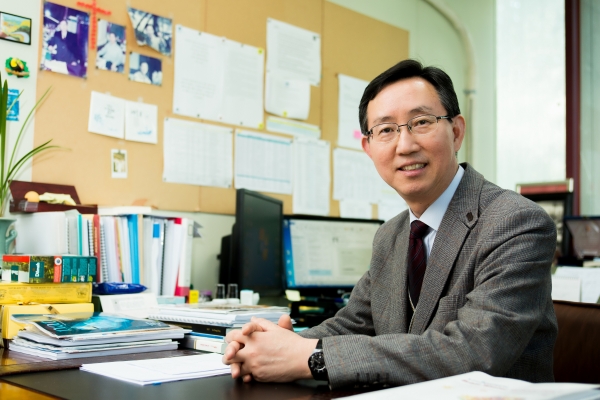Professor Kyong-Tai Kim was appointed as a professor of the Department of Life Sciences at POSTECH in 1991 and has been teaching students for the past 30 years.
My Research
My current research focus is on developing preventive and therapeutic treatment of neurodegenerative diseases. Korea has become an aging society where more than 14% of the population are elderly people aged 65 years or older, and it is expected to become a super-aging society within a few years. Although the average life expectancy has increased to more than 100 years, the most threatening disease to the elderly is neurodegenerative brain diseases such as Alzheimer’s disease. Nowadays, nearly 50% of the population aged 85 or older have dementia, which is a big social problem. Prevention and treatment of dementia is urgently needed for a healthy old life. Therefore, I am focusing on developing drugs that can prevent or slow the progression of Alzheimer’s disease. In addition, I am interested in cancer. The probability of cancer, especially brain, lung, and prostate cancer, increases with aging. Hence, I am striving to develop targeted anticancer drugs.
Research Topic; the Milestone of Research
The life I experienced from undergraduate and graduate school to postdoctoral researcher built the foundation for my research life. That period of my life was a time of training to learn the attitude and method of being a scientist. After completing my training as a researcher, I have spent 30 years as an independent principal investigator at POSTECH. The more I concentrated on the research topic that started in my laboratory, more new discoveries came out. As I pursued such discoveries with curiosity and interest, it naturally developed into a new research topic. The new research topic was not completely out of touch with the existing topic, but was derived from it, so I could easily adapt to the new topic. Of course, when studying a completely new topic, I had to understand the background knowledge, catch up with recent research trends, and learn new research techniques that I had never used before. In this situation, I overcame the difficulties by receiving advice from experts in related fields and by promoting joint research with them. When I set a new direction for the research and push ahead with it, I always encounter challenging problems. But when I overcome them, my research capabilities substantially grow. So, with new experiments, I was able to immerse myself in the research through the tension of the research that I had never experienced and the expectation of the new results that I may receive.
What is Science?
I think science is about identifying the components of the material world, elucidating them, and understanding their acting principles. Among various fields of science, I am studying life science, and life needs so many components. I think life science is about revealing the identity, structure, and function of these components of life, and understanding the phenomena that these components consequently show. Therefore, studying science is to understand how functions and roles of material components are designed and how the inherent driving laws and regulatory mechanisms allow harmony in nature. Scientists are considered as people who seek and investigate the functional components of the material world through careful observation and repeated experiments, and use them to solve the problems we face. We are constantly confronted with health care, environmental, food, energy, political and social problems. So, should not one of the purposes of science be to understand scientific principles and use them to solve the problems of human society? Therefore, it is believed that science can give us the possibility of having a “better world”.
Further Plans
Looking back on my life in POSTECH, I think there are so many things to be thankful for. I got a chance to meet and have fellowship with good seniors, colleagues, junior professors, and many students I really cherish and love. I have spent years with them, and it is not long before I leave the campus. I may divide my life into three stages. The first stage was about 30 years of training and learning about science. The second stage was about 30 years of life at POSTECH. I cherished my time of hard research at POSTECH, and spent time teaching and guiding students. I just looked ahead and moved on, but many things made me proud and feel my works worthwhile. Now, it is time for the second act of my life to end, and prepare for the third act. I am expecting to have a slightly different attitude towards life in the third stage of my life. I may lay down the responsibilities and obligations I had as an educator and a researcher, and design the rest of my life with a relaxed mind. After retirement, I want to look back and serve the people around me. I think I was the center of my life so far. Most of the attention was limited to something that I was personally involved in, such as student guidance, research, family, and the organizations I belonged to. But from now on, I look forward to paying attention to a wider field. I want to share what I have with my neighbors. I will share valuable knowledge, which I gained through books, papers, and research. I will find a way to help my students who are working at universities, research institutes, companies, and startups. Last but not least, I want to live by cherishing social relationships with various people and fulfilling their needs by sharing my experiences. I think it will be a rewarding life if I can pay attention to my neighbors who are in need, give them a little help spiritually, mentally, and economically, and make my surroundings brighter and happier. Why not serve the world!

Department of Life Sciences


